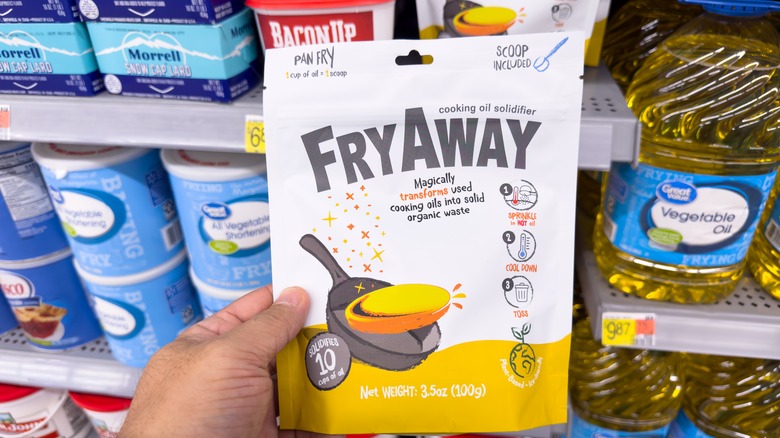Where Is FryAway From Shark Tank Today?
We may receive a commission on purchases made from links.
UPDATE 12/18/23: The original version of this article included inaccurate financial information related to FryAway that has since been corrected.
If you've ever had to cook with significant amounts of oil, you know the most annoying part of the process is disposing of the leftover stuff after you're done cooking. You should never pour oil or grease down the drain because it creates "fatbergs" that clog the sewer system and create environmental hazards, and dumping it directly in the trash is a surefire recipe for a leaky, disgusting trash bag. Your best bet is to find a container to put it in and dispose of both the oil and the container. But what if there was an easier way?
That was the question Laura Lady asked on Season 14, Episode 13 of "Shark Tank," which aired on January 27, 2023. Lady's product, FryAway, is a powder that causes oil to rapidly congeal, allowing for easy disposal. The idea, which she repeatedly pointed to on the show, is to prevent fatberg formation by giving people an easy alternative to pouring oil down their sink — and it was an idea that ultimately grabbed the interest of two of the Sharks.
What happened to FryAway on Shark Tank?
Mark Cuban (currently participating in his last season on the show) was not that into the idea at first, but Laura Lady's assertion that the product has strong international appeal ultimately changed his mind. Once Cuban showed he might be in, Lori Greiner also spoke up for the product's potential. She was impressed by Lady, remarking that the FryAway proprietor "was doing every single thing right." Greiner and Cuban decided to team up and offer FryAway a deal.
Lady started by asking for a $250,000 investment. In return, she hoped to give one of the Sharks a 10% stake in her company. Of course, her numbers were not set in stone, and once Cuban and Greiner both expressed interest, negotiations ensued. The Sharks said they would invest the $250,000 she requested but wanted to split 25% of FryAway in exchange. While she couldn't get them down to 20%, the Sharks lowered their asking point slightly, and ultimately, all three agreed to 22%.
What happened to FryAway after Shark Tank?
The immediate response to FryAway's appearance on the show was overwhelmingly positive — unsurprising since it's a product that has a clear application. Laura Lady told online business strategist Joe Pardo that orders instantly streamed in, with her whole family getting caught up in packing those boxes for shipping. Media coverage in the wake of FryAway's appearance on "Shark Tank" was overwhelmingly positive, with write-ups in Food & Wine and The Spoon that discussed its potential environmental impact. BuzzFeed even listed it as one of the coolest Shark Tank products of the year. It seemed like the company had nowhere to go but up.
While the initial reception to FryAway was seemingly positive, it's hard to definitively state how the company has fared in the aftermath. Additionally, as some social media users have since pointed out, it's possible FryAway's breakout product isn't as original as it might seem — at least to an American market.
FryAway might not have been an original idea
It turns out there's already a Japanese product on the market called Katameru Tenpuru which, by all appearances, precedes FryAway by a few years. As one "Shark Tank" fan has pointed out on the r/sharktank subreddit, Katameru Tenpuru has been on the market for a while, at least for non-American consumers writ large. Indeed, reviews on retail sites like Amazon date the availability of that particular product sometime before FryAway's debut on the show, if you go by those composed and posted by customers who identify themselves as based in the U.S. (It's also not even the only cooking oil solidifier on the market: You can also easily buy similar products from Lanbeide, LaSyl, and the aptly named SolidiFry.)
All of this could help explain why it's unclear if the deal with the Sharks ever actually closed. Though Lauren Lady hasn't commented on the issue recently, it's possible that the deal with Lori Greiner and Mark Cuban never actually materialized — at least when it comes to data publicly available, that is.
Is FryAway still in business?
FryAway is still in business — you can order it online from Amazon, as well as from the company itself — but as to how well it's doing? Well, that's difficult to say. Information about the company's financials is, by all appearances, unavailable online, nor is there any verifiable information or data that points to whether Lauren Lady's deal with the Sharks ever closed. Neither Mark Cuban nor Lori Greiner lists the product among their investments on their personal websites.
FryAway's social media presence, while comparatively small, also isn't necessarily indicative of whether or not the company is doing successfully. Its Instagram page has a modest following of 3,500 users (though the company account posts fairly regularly), while its Facebook sits at less than 700. This is particularly surprising, given its exposure and the fact that even if deals don't close, companies that appear on the show often see a significant bump in social media presence (referred to as the "Shark Tank Effect").




